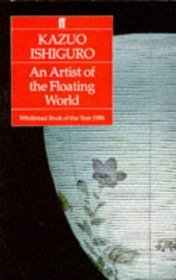Helpful Score: 1
"Good writers abound - good novelists are very rare. Kazuo Ishiguro is... not only a good writer bu also a wonderful novelist." -New York Times Book review.
Winner of the 1986 Whitbread prize and shortlisted for the 1986 Booker prize, this book is about the artist Masuji Ono and is told mainly as he reminiscences about the past. It focuses on how his view of Japan as a dominating imperialist force during WWII now causes grief and difficulty for himself and his family in postwar Japan. The novel is written simply and lyrically, full of understated tension established in each dialogue, and gorgeously descriptive prose. It was even more understated compared to Ishiguro's other works, such as "Remains of the Day," or "Never Let Me Go," which I tended to enjoy a bit more. However, this is still well worth a read as Ishiguro's first novel.
Winner of the 1986 Whitbread prize and shortlisted for the 1986 Booker prize, this book is about the artist Masuji Ono and is told mainly as he reminiscences about the past. It focuses on how his view of Japan as a dominating imperialist force during WWII now causes grief and difficulty for himself and his family in postwar Japan. The novel is written simply and lyrically, full of understated tension established in each dialogue, and gorgeously descriptive prose. It was even more understated compared to Ishiguro's other works, such as "Remains of the Day," or "Never Let Me Go," which I tended to enjoy a bit more. However, this is still well worth a read as Ishiguro's first novel.
Great story with subtle reminders of the past, during war times and decisions the characters have to live with. Also, family points of view that come out along the way. Beautifully written, the words flow as if written in poetry, each paragragh paints a picture.
This work of art was a real treat for me. I have always been most curious of Japan and the culture, especially of this time period, covered. I feel that this is a study of not only post-war Japan but also of the interactions of parent and adult children in Japan and of a widowed father attending the traditions of all required in the attaining of a marriage, in this case, Mr Ono for his daughters Setsuko and Noriko. It also portrays the serious nature that artist can have on their life and the lives of others even their country.
So here in this small book, we have the life of Mr Ono from his childhood and young adult ages through unto that of accomplished artist, revered by some, viewed as a traitor by others. Ishiguro gives us another opportunity to look at someone's day-to-day life under the microscope and see all the little nuances that make up this thing we call Life.
So here in this small book, we have the life of Mr Ono from his childhood and young adult ages through unto that of accomplished artist, revered by some, viewed as a traitor by others. Ishiguro gives us another opportunity to look at someone's day-to-day life under the microscope and see all the little nuances that make up this thing we call Life.




